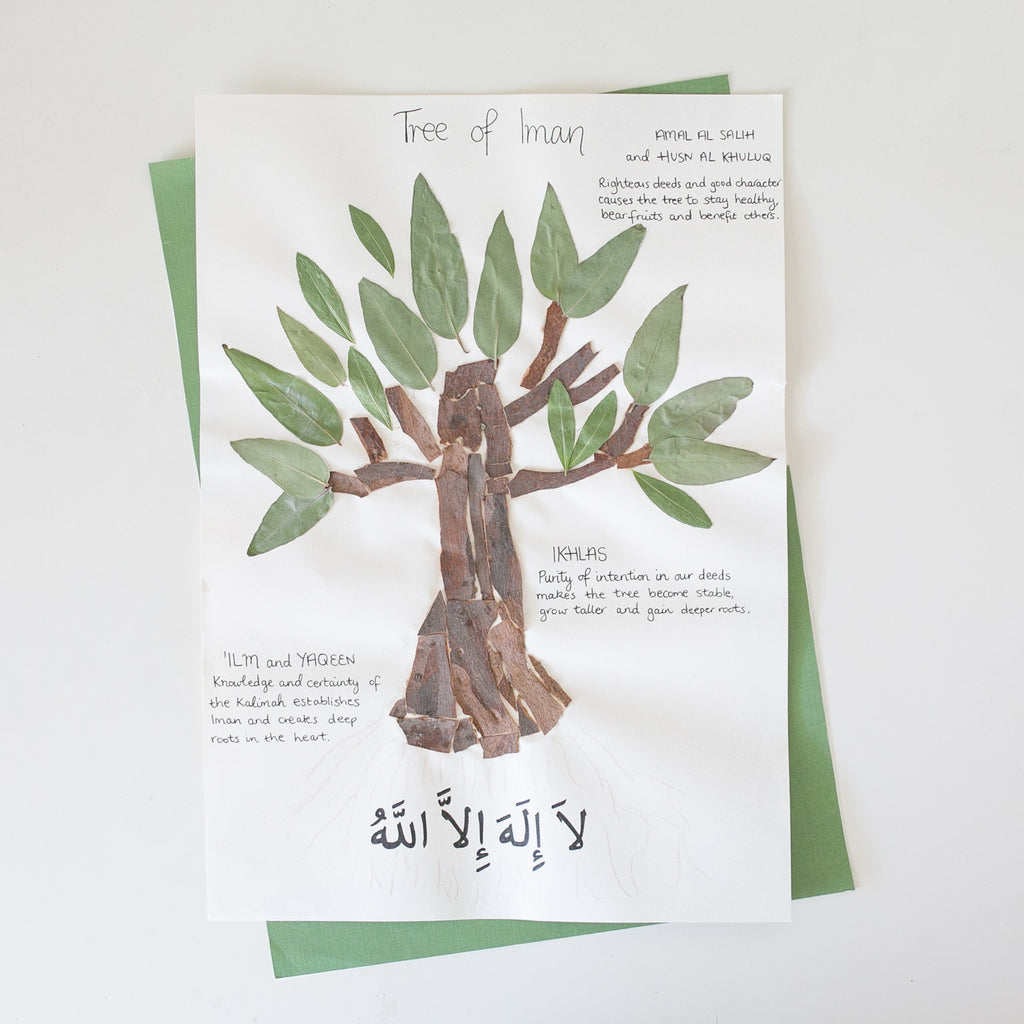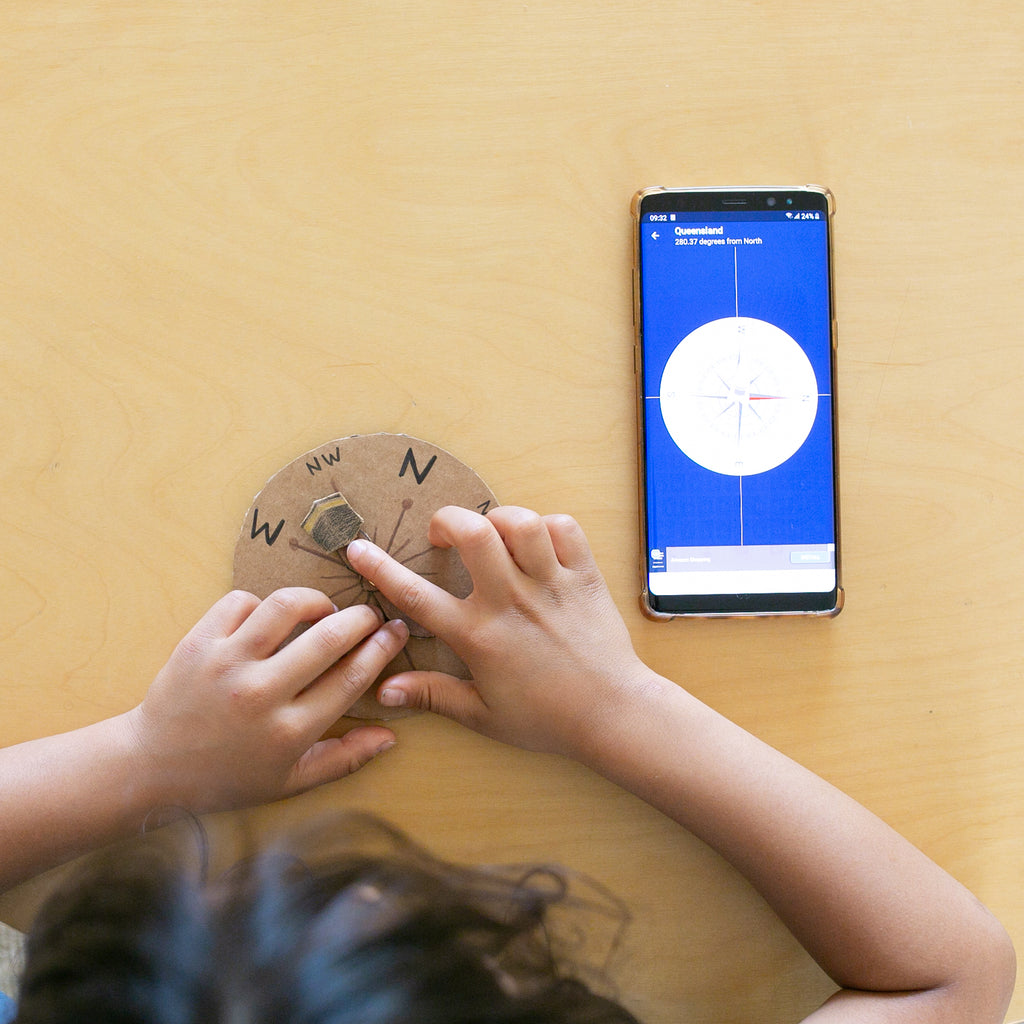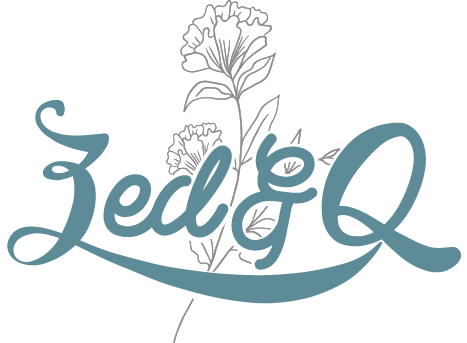We are our children's first teacher, so raising them to be Allah-conscious and kind Muslims should be a priority.
My husband and I have made it a habit to mention Allah in our home daily so that our children gain a love and an understanding of Him.
Yaseen, who is now 5 years old, is ready to expand on his Islamic knowledge. Based on his interests and developmental stage I made learning aids to help him learn about the 5 Pillars of Islam; our new unit. My son, Yusuf, who is 3 years old, will be tagging a long learning mainly from puzzles, role modelling and storytelling.

The 5 Pillars are obligatory and help Muslims put their faith into practice. They consist of.
Shahadah: testimony of faith (sincerely affirming that no partner can be associated with God and Muhammad is His final Messenger)
Salah: performing acts of prayer in the correct manner five times a day
Zakat: paying an alms tax to the poor and needy
Sawm: fasting during the month of Ramadan
Hajj: pilgrimage to Mecca
For this unit, I'll be focusing on the first 3 Pillars; Shahadah, Salah and Zakat, with each Pillar consisting of 3-5 lessons.
In order to teach our children, we need to teach ourselves first. I listened to some YouTube videos about the meaning of la illaha illa Allah and was blown away by what these few words actually mean! I briefly mentioned the Shahadah to Yaseen, and asked if he understood it. Of course he said no. In order to understand why we worship Allah, we need to go back to the foundation and start with the categories of Tawheed. Once we understand the WHY, we then proceeded with the meaning of the Shahadah. It makes it easier to understand why we negate all false deities and only worship the One who sustains us.

(Part 1)
The Shahadah is to declare the belief in the oneness of God (Tawheed) and to accept Muhammad ﷺ as God's final Messenger.
أشهد أن لا إله إلاَّ الله و أشهد أن محمد رسول الله
"I bear witness that there is no deity (worthy of worship) except for Allah and I bear witness that Muhammad ﷺ is the (final) messenger of Allah."

The Shahadah is the first and most important pillar, which all other pillars revolve around. In order to witness the truth, one must first grasp the meaning of these words and understand what the Shahadah is affirming and denying.
Our first lesson started with a visual introducing the core principle of Islam, Tawheed (Oneness of Allah). Visuals are important in our home as they provide an opportunity for daily discussion.
(Part 2)
Before we reviewed the words of the Shahadah, Yaseen continued to build upon his Tawheed knowledge through a DIY cardboard puzzle (purchase printable HERE).
Cardboard puzzles are a big thing in our home because it's one way my boys enjoy learning. This makes it easier for me to observe where they're at, how far they've come and areas they need further assistance in.
 (Part 3)
(Part 3)
Yaseen has a new profound love for drawing and writing, so we discussed the meaning of the Shahadah.

The Shahadah consists of two testimonies:
The first part, Laa ilaaha illallah (لا إله إلاَّ الله ), is to affirm one's belief in Islamic monotheism. When this is stated, one is obligated to leave all false deities behind and direct all forms of worship to Allah alone.
The second part, Muhammadur rasulullah (محمد رسول الله), states that Prophet Muhammad (ﷺ) is the messenger of Allah. By testifying this, one acknowledges that he was sent by Allah as a the final prophet with the final revelation, the Qur'an. One is obligated to follow his teachings, orders, advice, and recommendations etc. which are known as the Sunnah.
(Part 4)
We crafted a Tree of Iman for his work. It's an example of how understanding the Kalimah (la illaha illah lah) can lead us to become a righteous person with an outstanding character.
The Tree of Iman is a good tree to which Allah likened the word of Tawheed (Qur'an 14:24). When a tree has firmly fixed roots and a healthy trunk and branches, it'll produce good fruits. Similarly, knowledge and certainty of the Kalimah establishes deep roots of Iman (faith) in our heart. Our pure intention in our deeds helps the trunk become stable, grow taller and helps develop deeper roots. Our righteous deeds and good character causes the tree to stay healthy and bear fruits.

Trees need to be nourished and protected, and so do we. We spoke about how Allah waters the tree and allows it to bask in the sun to grow, and similarly we nourish ourselves with prayer, dhikr (remembrance of Allah) and good deeds. Trees have thick bark or thorns to protect themselves from weeds, animals and humans etc., and we have Allah to protect us from the evil whisperings of Shaitaan. The stronger our understanding of the Kalimah, the harder it is for Shaitaan to play his tricks!
There is no life on earth without trees, and so too, without the kalimah there is no life in the heart; it becomes spiritually dead.
(Part 5)
(Part 6)
For our last lesson, we dived into the meaning of Surah Al Ikhlas.
This Surah is one of the most important chapters in the Qur'an because it's about the unity and oneness of Allah. It describes Allah's attributes and how he would like us to know Him.

I made this Surah Ikhlas workbook for both Yaseen and I. It helps us to understand words, learn a brief tafseer, reflect upon Allah's names and helps us create an action plan based on this surah.
(Purchase HERE)


(Part 1)
Salah is an obligatory form of prayer performed by Muslims 5 times a day. It involves physical movements such as, standing, bowing, prostrating, and sitting, and involves recitation from the Qu'ran. One precondition of Salah is Wudu - a special purification to help us get ready spiritually and physically.
I've set up my children's wudu area so they can splash and have fun while practicing how to perform Wudu correctly. We have:
- Wudu stickers from @emaanboost
- A small bowl
- A water bottle - to use water wisely (the Sunnah is to use a 'Mudd' (approx. 3-4 cups) of water)
- Toothbrushes/Miswaks - a Miswak is a natural twig toothbrush with many health benefits.

Teaching bathroom etiquette has been ongoing since the boys were toddlers. The only advice I can give is to role model everything! Vocalise what you are doing. Allow your children to hear and watch you. Cleanliness is an important part of Islam and it's vital to teach them from a young age.
(Part 2) Fiqh of Purification
I set up 3 types of water we can and cannot use for wudu and then discussed.
First Jar - Mutlaq Water (water that cleans things)
Includes: Rainwater, Snow, Seawater, Tap water, Bottled Water, River.
It's pure by nature so permissible to make wudu in.

Second Jar - Water Mixed with Pure Elements (water that can not clean things)
Includes: Water mixed with Tea, Milk, Juice, Soda, Coffee, Dirt etc.
If water is mixed with something pure AND it alters the smell, taste or colour then it is still clean water, however, can not be used for wudu.
For example, our second jar contains tea. It changed all three factors listed above, so it can not be used for wudu. We also experimented with leaves and dirt. Water mixed with some leaves can still be used for wudu as it's a pure element which did not alter smell, taste or colour.

Third Jar - Water Mixed with Impure Elements (dirty water)
Includes: Blood, Dog's Saliva, Urine, Faeces etc.
If impure things fall into the water and alter the smell, taste or colour, it becomes dirty therefore can not be used for making wudu. If this water touches our clothing, we must clean it.
For example, our third jar contains blood (food colouring). Since it's just a small amount of water it had changed the colour, therefore not considered clean to make wudu in.

(Part 3) Fiqh of Wudu
"O believers! When you rise up for prayer, wash your faces and your hands up to the elbows, wipe your heads, and wash your feet to the ankles". (Surah al Ma'idah, 5:6).
A drawing illustrating the Fard and Sunnah Acts of Wudu.
Fard acts are obligatory acts Muslims must do. (One gets rewarded if done or sinned if not done).Sunnah Acts are voluntary acts done by the Prophet ﷺ, (also known as the Sunnah). One gains more of Allah's pleasure if done and does not get sinned if left out.
I always recommend the sunnah in our home, but knowing that there's another alternative helps us in difficult situations. Understanding that Allah doesn't burden us makes us love the simplicity of Islam even more.

(Part 4) Fiqh of Wudu
Hands on play with a Fard vs Sunnah Venn Diagram to see how much he has retained. There are many benefits of wudu but we only discussed a few:
- It gives physical purity.
- Wudu eliminates our bad deeds and (minor) sins.
- It strengthens us spiritually by giving inner peace (it's advised to make wudu to cool the body from the heat of anger).
We discussed ways in which we can break our wudu (urine, excrements, wind, deep sleep).

Yaseen's task was to place both Fard and Sunnah acts in order.

(Part 5) Salah
Conditions of Salah include:
-
Must be a Muslim
-
Must be sane (have knowledge of what you're doing)
-
Must be of an age of understanding (from 7+)
-
Must have wudu (ablution)
-
Clothes and prayer area must be free from filth.
-
Covering the Awrah (areas of the body that are required to be covered). For a women this must be the whole body excluding face, hands and feet (depends on scholars you follow). Men must cover between their navel to their knees.
-
Commencement of time - we can not pray earlier
-
Face the Qiblah. To keep things simple for my 5 yo, I told him we pray between west-northwest. I explained that the sun rises from the East and sets in the west. We observed during those times, located the direction then used our Qiblah app to confirm.
-
Must have intention

 (Part 6) Salah Positions
(Part 6) Salah Positions
We've been working through Salah positions this week. We tried a variety of ways to practice and to recall what he has learned.
We learned the definitions of the positions with the help of @mysalahmat book then dived into playing.
I like to incorporate movement in our lessons, so for this activity I called out the position then he acted it.

More movement! Once the position was called, his job was to throw a bean bag in the correct basket.

Match up on day 4. Alhamdulillah he achieved 4/6 positions correctly.

(Part 7) Salah Times and Number of Rak'ah
Yesterday we revisited Salah times by working through our puzzle and cards. We had observed the sky and shadows during Ramadan to understand when it's time to pray.
He also learned that the 6 salah positions equal to one full rak'ah.

We moved on to the number of rak'ah in Fard and Sunnah prayers.

The whole purpose was not for him to memorise the number of rak'ah, rather to understand the importance of Sunnah prayers. We don't know how much of our Fard prayer is accepted. If anything is lacking, Allah will look to our Sunnah prayers to make up for what is lacking. How Merciful is He!
Sunnah prayers will always hold value! We focused on this hadith: "Whoever is regular with twelve Rak'ah of Sunnah (prayer), Allah will build a house for him in Paradise: Four Rak'ah before Zuhr, two Rak'ah after it, two Rak'ah after Maghrib, two Rak'ah after Isha, and two Rak'ah before Fajr." (Prophet Muhammad ﷺ)
(Part 1)
Zakat is an obligatory charity that enables us to fulfil the needs of the less fortunate. After each lunar year, all able Muslims are required to give 2.5% of the wealth they possess above a certain threshold.
Zakat purifies our soul from stinginess, greed and love of wealth. It helps comfort the poor and fulfils the needs of the needy, distraught and the deprived people. Withholding Zakat is like depriving the poor of their due share.
A little conversation with Yaseen (5):
"Yaseen, do you know what Zakat is?"
"Charity"
"Yes, it's a special type of charity"
"Do you know how much money we give in Zakat?"
"A lot, all of it!"
"Really, then how will I buy you food?" *looks unsure*
"Come, let's work out how much we give together"

This picture illustrates the little we give in order to fulfil this obligation. When you think about it, it's really not that much! By separating the portion that belongs to the poor Allah purifies our wealth.
(Part 2) Conditions of Zakat
Before this lesson Yaseen thought Zakat was the regular Charity (Sadaqah) we do everyday - feeding the poor, helping someone etc. So we continued to discuss and differentiate between the Zakat and Sadaqah.
In this lesson we discussed who is obligated to pay Zakat:
- The sane Muslim
- Owns enough assets intended for increasing wealth. Pictured examples include gold, agriculture, business inventory (hats) and livestock.
- Assets need to exceed the minimum threshold.
- Assets must be in possession for one Hijri year.

Then we played a little game to reveal the 8 recipients of Zakat.



(Part 3)
The Prophet
ﷺ emphasised on giving many times.I made my children a money box to teach them about the monetary form of giving. To help encourage saving and giving at their own will. We spoke about how giving promotes happiness and that it's our duty to follow the Sunnah and help those in need.

(Part 4) Difference between Zakat and Sadaqah
Zakat and Sadaqah are types of worship done by Muslims. They're both considered charity, however they are different in their own respects. This venn diagram was his final lesson to show me what he understood between the two.
Here's what we covered:
-
Zakat is obligatory whereas Sadaqah is not obligatory but encouraged.
-
Zakat is a Pillar of Islam while Sadaqah is not.
-
Zakat is the right of the poor from the rich whereas Sadaqah is the generosity of the rich to the poor.
-
Zakat has certain terms and conditions, Sadaqah has none.
-
Zakat is time specific, Sadaqah can be done all year round.
-
Zakat is monetary, while Sadaqah can be non-monetary too.


Our final 2 Pillars will be continued before Ramadan 2022, Insha'Allah!
I’d love to see you take inspiration from our learning resources. Please tag us if you choose to share your lessons in your social media posts. You’ll find us on
Instagram (@brb_raisingkids) and
Facebook (@brbraisingkids).








































